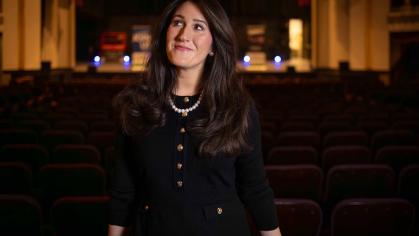Thomas Nosker, Inventor of Recycled Plastic Lumber, Receives Highest Honor for His Work

The Rutgers engineer has been named a 2024 National Academy of Inventors Fellow
The recycled plastic lumber that Rutgers Professor Thomas Nosker invented decades ago is now used all over the world in bridges, railway ties, docks and picnic tables.
It’s less dense than water, yet strong enough to support 120-ton locomotives. It is a nontoxic material, made from milk containers, coffee cups and other recycled plastics. It’s been used to make about 1.5 million railway ties in the United States alone. Since each tie weighs about 200 pounds, that means roughly 300 million pounds of plastics have not ended up in landfills, won’t choke marine life, and won’t soil beaches.
The material is so ubiquitous, Nosker even spotted it on walkways and fencing when he was vacationing in the Galapagos Islands, off the coast of Ecuador, earlier this year.
“I travel a lot and it’s in every country. I’ve been to China, I’ve been all over Europe and recycled plastic lumber is everywhere,” he said.
For that invention and his many other contributions, Nosker has been named a 2024 National Academy of Inventors (NAI) Fellow, the highest professional distinction awarded to academic inventors. He is one of 170 inventors elected into the Class of Fellows.
“Getting recognized by any national academy is an honor, and to be a fellow in the national academy is what most professors would dream of,” said Nosker, an assistant research professor in the Department of Materials Science and Engineering at Rutgers University-New Brunswick.
Nosker is the 13th Rutgers instructor to be named an NAI Fellow. He will be formally inducted during a ceremony in June in Atlanta.
“This year's class of NAI Fellows represents a truly impressive caliber of inventors,” Paul Sanberg, president of the NAI, said Tuesday in a release announcing the inductees. “Each of these individuals is tackling real-world issues and creating solutions that propel us into the future. Through their work, they are making significant contributions to science, creating lasting societal impact, and growing the economy.”
Nosker and his colleagues in the School of Engineering have been on the leading edge of plastics research since the 1980s.
“I’ve been the ‘Plastic Guy’ for decades,” Nosker quipped.
He is a prolific inventor with about 82 patents or patents pending in the United States. His latest project involves developing a light but strong plastic composite that’s extremely stiff, so it can be used in next-generation tanks, aircraft and cars. The lighter material is better in transportation, allowing for faster and farther travel.
Nosker’s idea is to use graphene, which comes from graphite commonly used in pencils, as a stiffening agent.
“I figured out a way to use graphite – which is 50 cents a pound – and separate the layers, in situ in molten polymers down to an atomic layer,” he said. “It’s probably the most important thing I’ve done.”
The plastic lumber invention created numerous jobs and made an impact socially, Nosker said, but the graphite exfoliation will contribute to America’s military and industrial dominance because it would allow for lighter, more fuel-efficient vessels. Currently, Nosker’s invention is in the licensing process, as Rutgers works to find a company to produce his innovation on a larger scale.
Nosker was born in Ohio, raised in Georgia in a town now called Brookhaven, a suburb of Atlanta. As a boy, he thought he would end up being a car mechanic because that’s what most men he knew did. As a teen, he wanted to get into a profession with longevity. He entered Georgia Tech to study engineering. Soon after he graduated, his father died so he decided to move with his mother to New Jersey, where two of his siblings lived. He enrolled at Rutgers as a doctoral student. He had not intended to stay in New Jersey, but he met his wife at Rutgers, and they never left, raising two boys here.
“I’ve had a miraculous life,” Nosker said. “A kid from Georgia ends up developing something that is all over the world. That doesn’t happen to very many people. It’s kind of a miracle.”




